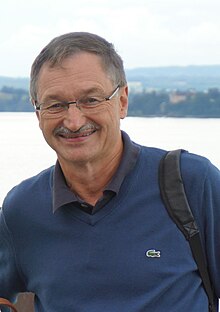Dieter Schrenk
Dieter Franz Schrenk (born January 11, 1953 in Hameln / Weser) is a German toxicologist and university professor . From 2004 to 2018 he was head of the food chemistry and toxicology department at the Technical University of Kaiserslautern .
Life
Schrenk studied food technology at the University of Hohenheim from 1971. After graduating in 1977, he began studying medicine at Heidelberg University. In addition to his studies, he did his doctorate at the German Cancer Research Center in Heidelberg and completed his doctorate as Dr. rer. nat. (at the University of Hohenheim) and the medical state examination in 1983. Since 1983 he has been working on a medical doctoral thesis at the Physiological-Chemical Institute of the University of Tübingen and completed his PhD. med. there from 1984. After the practical year and military service, he became a research assistant at the Toxicological Institute of the University of Würzburg ( Dietrich Henschler ) in 1986 and in 1987 moved to the Department of Biochemical Toxicology at the University of Göttingen (Prof. KW Bock). In 1988 he moved with Karl Walter Bock to the Institute for Toxicology at the University of Tübingen, where he worked as a scientific assistant. After a one-year research stay at the National Cancer Institute (NIH, Bethesda, USA) in S. Thorgeirsson's laboratory, he became a specialist in pharmacology and toxicology in 1993 and completed his habilitation in toxicology at the Medical Faculty of the University of Tübingen in 1994. In the same year he was appointed to the C3 professorship for food chemistry and environmental toxicology at the University of Kaiserslautern. There he became the spokesman for the DFG graduate school 'Biotechnology' and from 2000 to 2002 dean of the chemistry department. In 2004 he was offered the C4 professorship for human nutrition at the University of Jena, which he refused. In the same year he was appointed to the W3 professorship for food chemistry and toxicology at the Technical University (formerly 'University') of Kaiserslautern as the successor to G. Eisenbrand. Schrenk is married and has two daughters. Since 2018 he has been a senior professor for research at the Technical University of Kaiserslautern
research
Schrenk already dealt with the question of the metabolic activation of chemical carcinogens (cancer-causing substances) in his doctorate in Heidelberg. He continued this work in Würzburg, Göttingen and Tübingen, always with the aim of being able to better assess the significance and extent of such activation reactions for the specific cancer risk for humans. In addition, he has been working since around 1990 on the importance of the dioxin or aryl hydrocarbon receptor, which is responsible for most, if not all, of the toxic effects of dioxins. At the Technical University of Kaiserslautern, research projects on the development and prevention of chronic intestinal diseases and the activation of naturally occurring plant carcinogens in food (alkenylbenzenes, furocoumarins, pyrrolizide alkaloids) were then added. Schrenk is (co-) author of more than 140 original publications and reviews in scientific journals as well as editor of the book "Chemical Contaminants and Residues in Food" and the "Poison Lexicon" and was spokesman for the research association funded by the Federal Ministry of Education and Research from 2002 to 2009 "Nutrition Net" on the role of nutrition in the development and prevention of colon cancer.
Activity in committees
From 2002 to 2010 Schrenk was a member of the Senate Commission for Food Safety (SKLM) of the German Research Foundation (DFG) and worked on the executive committee of the European Toxicologists Association Eurotox. He was also chairman of the toxicology section of the DGPT (German Society for Experimental and Clinical Pharmacology and Toxicology) for two years. In the DGPT he was the spokesman for the 'Carcinogenesis' working group. Since 2018 he has been chairman of the CONTAM panel of the European Food Safety Authority (EFSA) and a member of the drug commission of German pharmacists. Until 2019 he was a member of the Executive Committee of the International Union of Toxicology (IUTOX) and headed the 'Education' subcommittee, in which he continues to act as an 'Advisor'. He is the initiator and was the head of the first master's degree in toxicology at a German university (at the Technical University of Kaiserslautern).
Honors
In 2009 Schrenk received the teaching award of the state of Rhineland-Palatinate for outstanding achievements in teaching and in 2014 the Merit Award from Eurotox for his services to toxicology.
Publications
- Chemical Contaminants and Residues in Food (Elsevier 2017) (with A. Cartus)
- Poison dictionary (German pharmacist publisher; loose-leaf collection; previously Seeger and Neumann)
- Dioxin toxicity, aryl hydrocarbon receptor signaling, and apoptosis-persistent pollutants affect programmed cell death. Crit. Rev. Toxicol., 2011, 41, 292-320 (with M. Chopra)
- Application of the equivalency factor concept to the phototoxicity and -genotoxicity of furocoumarin mixtures. Food Chem. Toxicol., 2014, 68, 257-266 (with N. Raquet)
- Metabolism of the carcinogen alpha-asarone in liver microsomes. Food Chem. Toxicol., 2016, 87, 103-112 (with A. Cartus)
- Interim relative potency factors for the toxicological risk assessment of pyrrolizidine alkaloids in food and herbal medicines. Toxicol. Lett., 2016, 263, 44-57 (with KH Merz)
- Current methods in risk assessment of genotoxic chemicals. Food Chem. Toxicol., 2017, in press (with A. Cartus)
Web links
- https://www.chemie.uni-kl.de/schrenk/prof-dr-dr-dieter-schrenk/
- http://www.eurotox.com/sub/eurotox.com/images/awards/Schrenk_x_web.pdf
- http://www.gesundheitsforschung-bmbf.de/de/schuetzt-apfelsaft-vor-darmkrebs.php
| personal data | |
|---|---|
| SURNAME | Schrenk, Dieter |
| ALTERNATIVE NAMES | Schrenk, Dieter Franz (full name) |
| BRIEF DESCRIPTION | German toxicologist and university professor |
| DATE OF BIRTH | January 11, 1953 |
| PLACE OF BIRTH | Hamelin |
